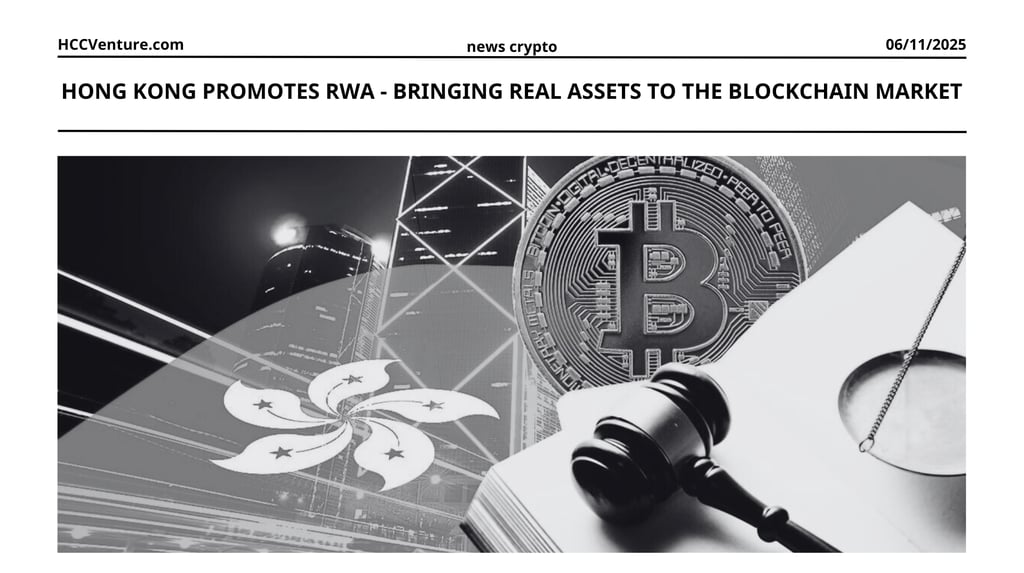Hong Kong promotes RWA - bringing real assets to the blockchain market
Hong Kong, Asia's bustling financial hub, is at the center of a heated race to digitize the world's real assets (RWA), with the goal of putting real assets on the Blockchain.
11/6/20252 min read


HKMA's Sandbox Sparks Tokenization Boom
The race to tokenize real assets (RWA) has reached new heights in Hong Kong, where regulators, mainstream financial institutions and blockchain pioneers are working together to transform “real” assets into “digital” ones. This joint push underscores Hong Kong’s ambition to become Asia’s digital asset finance capital, combining traditional market depth with emerging blockchain infrastructure.
From real estate and private equity to gold and treasury securities, the city is looking to tokenization as a bridge between regulated capital markets and decentralized finance (DeFi) — a sector that currently holds trillions of dollars in potential liquidity globally.
Key enablers include the “Project Ensemble” initiative, a multi-bank pilot program to tokenize $3.8 billion in money market funds on China Merchants Bank’s BNB Chain, marking Beijing’s boldest foray into RWAs despite mainland China’s tightening measures.
The HKMA’s approach — which balances innovation with a $350,000 capital requirement for issuers — has attracted $5 billion in sukuk bonds and tokenized shares since July, according to PwC data, far outpacing Singapore’s $2 billion pilot program.
Policy and Regulatory Drivers
The Hong Kong Securities and Futures Commission (SFC) and the Hong Kong Monetary Authority (HKMA) have both introduced explicit frameworks to support asset tokenization pilots. These include the Green Bond Tokenization Initiative, launched in partnership with the Hong Kong government, and sandboxes that allow banks and fintechs to issue tokenized products under supervision.
The approach is pragmatic: Hong Kong aims to digitize without destabilizing, ensuring that every tokenized asset — whether bonds, treasury stocks, or real estate shares — is legally recognized and fully backed by audited underlying assets.
This regulatory clarity sets Hong Kong apart from other regional hubs that are still struggling to comply. The city’s clear licensing pathways for virtual asset trading platforms (VATPs) and RWA issuance vehicles have attracted a wave of institutions, from banks to asset managers, looking to effectively combine blockchain with traditional market trust.
Technology infrastructure and token standards
On the technological level, most of Hong Kong’s RWA projects are built on Ethereum-compatible networks or permissioned chains that can interact with public ledgers. The city is also seeing the emergence of institutional-grade tokenization layers, backed by large custodians and fintech companies.
These platforms prioritize:
On-chain payments and proof of ownership via blockchain ledger.
Programmable compliance ensures all token transfers meet KYC and regulatory criteria.
Interoperability between tokenized RWAs, stablecoins, and DeFi lending pools — enabling the interoperability of capital markets and decentralized applications.
This integration of blockchain with finance, backed by regulatory certainty, could turn Hong Kong into a reference architecture for tokenized economies across Asia.
Analyst's view
The rapid expansion of RWAs in Hong Kong represents a combination of regulation and innovation—a balance few jurisdictions have achieved. By fostering collaboration between traditional financial firms and blockchain technology, the city is demonstrating that tokenization is not a threat to financial stability, but an extension of it.
The success of the Hong Kong model could reshape global perceptions of a “digital financial hub,” one built not on speculation, but on regulated interoperability, institutional-grade custody, and tokenized real-asset liquidity.
Disclaimer: The information presented in this article is the author's personal opinion in the cryptocurrency field. It is not intended to be financial or investment advice. Any investment decision should be based on careful consideration of your personal portfolio and risk tolerance. The views expressed in this article do not represent the official position of the platform. We recommend that readers conduct their own research and consult with a professional before making any investment decisions.
Explore HCCVenture group
HCCVenture © 2023. All rights reserved.

Connect with us
Popular content
Contact to us
E-mail : sp_contact@hccventure.com
Register : https://linktr.ee/holdcoincventure
Disclaimer: The information on this website is for informational purposes only and should not be considered investment advice. We are not responsible for any risks or losses arising from investment decisions based on the content here.


TERMS AND CONDITIONS • CUSTOMER PROTECTION POLICY
ANALYTICAL AND NEWS CONTENT IS COMPILED AND PROVIDED BY EXPERTS IN THE FIELD OF DIGITAL FINANCE AND BLOCKCHAIN BELONGING TO HCCVENTURE ORGANIZATION, INCLUDING OWNERSHIP OF THE CONTENT.
RESPONSIBLE FOR MANAGING ALL CONTENT AND ANALYSIS: HCCVENTURE FOUNDER - TRUONG MINH HUY
Read warnings about scams and phishing emails — REPORT A PROBLEM WITH OUR SITE.
